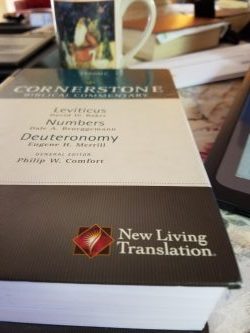Translations and Bible Study
I’ve been involved in occasional exchanges in another forum on the use of translations in Bible study. This individual seems to think that when he finds a translation that supports a particular point of view, he can just stick with that translation, and nobody should be able to question him. It’s one of the weirdest arguments I’ve heard about Biblical studies. It is close to the position of Peter Ruckman, who’s KJV Only stance is one of the firmest–and most ridiculous out there. Ruckman holds the KJV to be superior in authority to the Greek and Hebrew texts from which it was translated.
Even so, Ruckman’s position is much more consistent than that of the correspondent I just mentioned. Ruckman holds that the KJV is always the authoritative text, while this individual seems to believe in the authority of whatever Bible he has in his hand. (It’s still usually the KJV.)
His position is closer to one I hear from Christians in Bible study. They tell me that the English is good enough for them, and not to bother them with the source languages. Now as a practical point, provided that one studies texts in context, I think one can study the Bible in English or another language into which the Bible has been translated with little danger. Especially in English one can avoid difficulties of interpretation that arise from translation simply by comparing more than one translation. But even in that case a translation derives its authority from the source text, and not the reverse.
A little knowledge of the differences between the source languages and the one in which you study is also useful. For example, neither Hebrew nor Greek in the Bible use capital letters. The choice to capitalize is based on the interpretation of the translator, both of the meaning of the source text and of the style requirements of the target language. Do you capitalize a particualr pronoun? Let’s say you believe that pronoun might refer to the deity. Your choice to capitalize it or not will depend on an interpretational choice. Does it, in fact, refer to the deity? Does English stylistics require that a pronoun referring to the deity be capitalized? This issue becomes more complex with pronouns referring to Jesus In this case one’s trinitarian theology gets involved as well as stylistic considerations.
In John 3:5-8, the Greek word pneuma is used a number of times. It is capitalized in some cases and in some not. It is translated “spirit” in some cases and “wind” in others. The fact that a particular translator capitalizes the word in one case and not another does not constitute any sort of an argument as to the meaning of the word, other than that the particular translation team thought it should be interpreted that way. Another translation team might have thought differently. The important–and the only valid–arguments are the contextual arguments that led each translation team to its choices.
This is because the source Greek text did not have capital letters. The translation team made a choice. You can list this amongst the choices of various authorities, including commentators and other translators. But it does not decide anything.
I don’t want to discourage people from studying the Bible in translation. There are very good translations available. All you have to do is study each passage carefully in context, and where possible compare translations and interpretations so as to make sure you don’t get stuck with an interpretation that is not supported by the source texts. On the other hand, there are some things that you cannot properly investigate without recourse to the original languages. These are usually few and far between, and are generally minor. But you should be aware of the potential.
